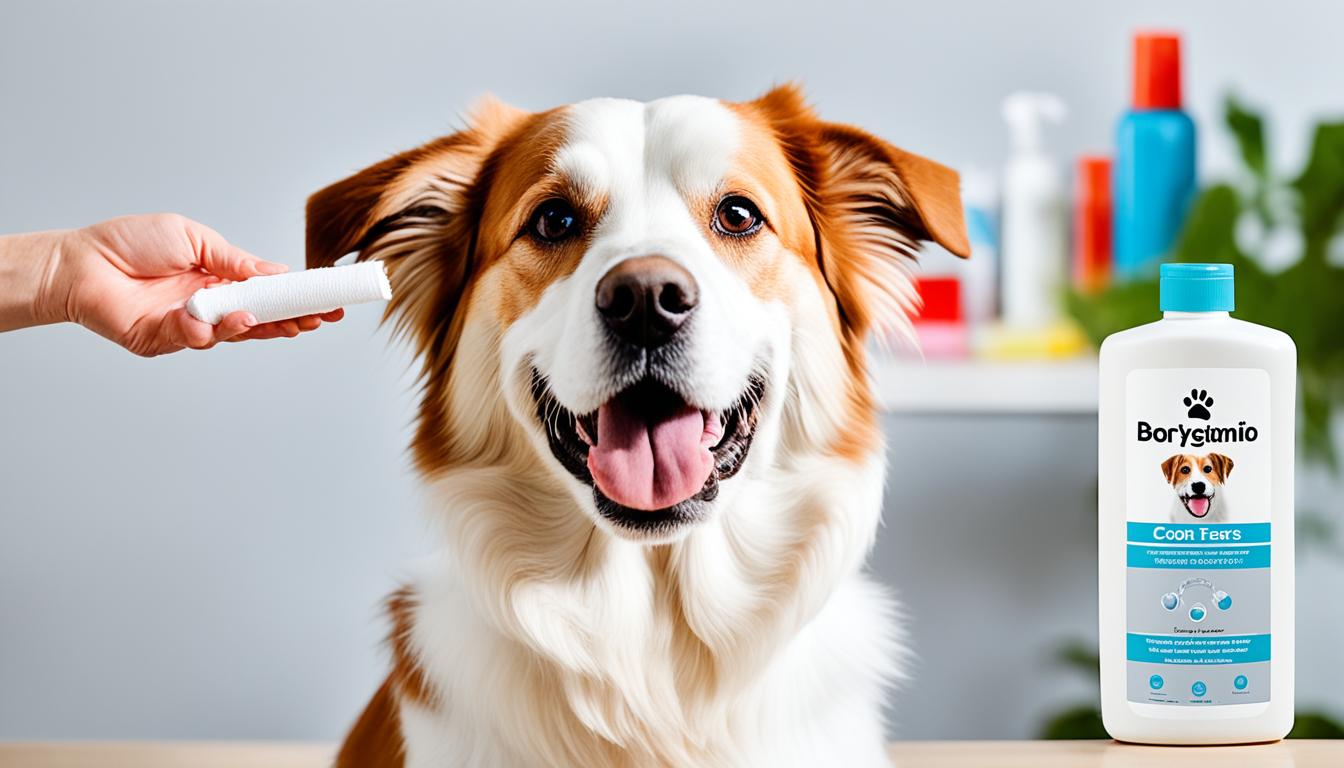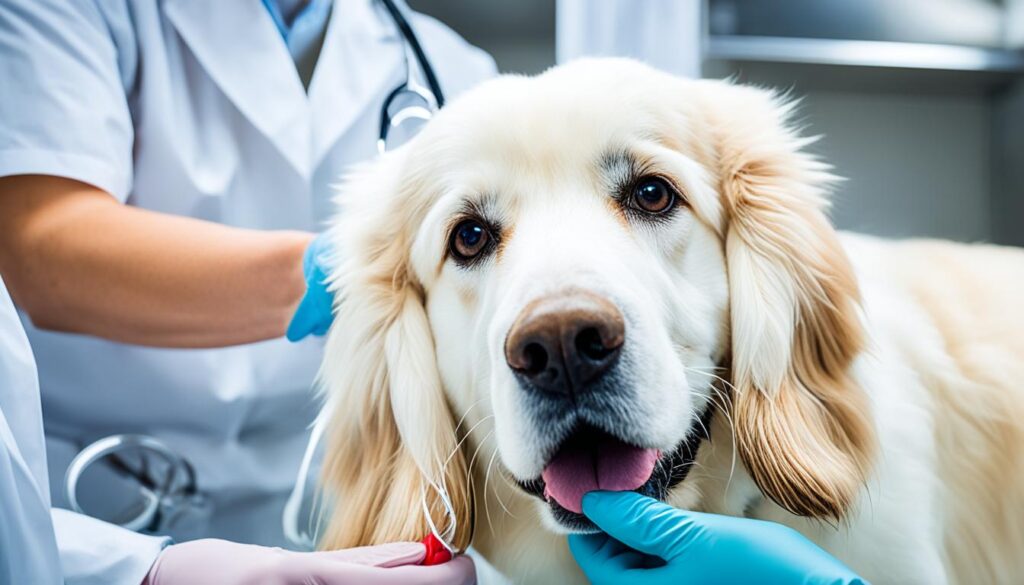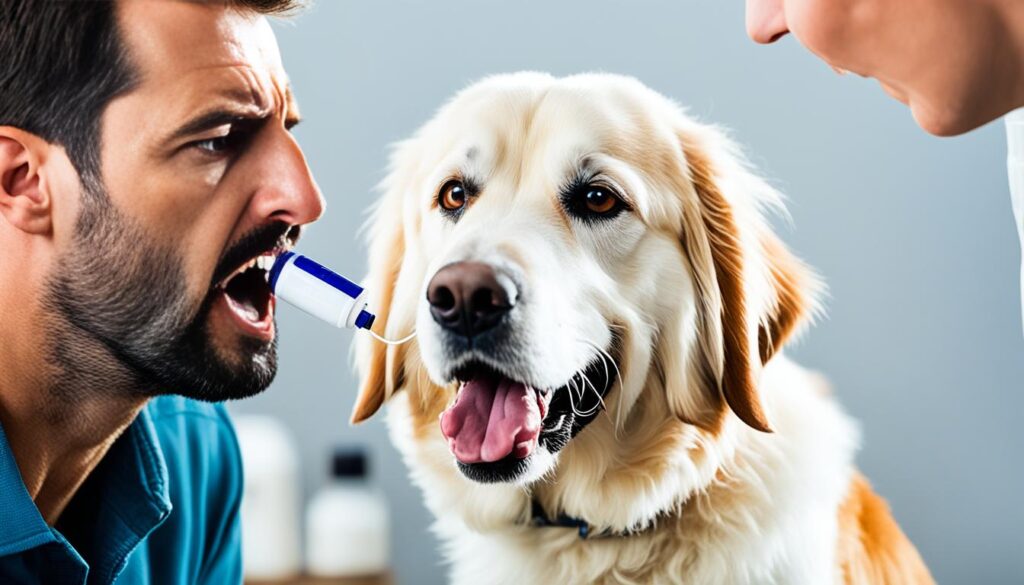Many people have used hydrogen peroxide to clean their pet’s ears for a long time. It’s commonly found in most homes. But often, it raises the question of whether it’s safe for our adorable pets. Knowing how to safely clean their ears is essential for good health. We’ll talk about why dog ears are special and how to clean them safely.
Cleaning your dog’s ears is more than just making them look good. It’s important for keeping their ears healthy. Hydrogen peroxide was a top pick for this job for years, but not anymore. Now, experts say it can be bad for your dog’s ears. Thankfully, there are many special ear cleaners just for dogs. These cleaners can keep their ears clean without causing harm.
Key Takeaways:
- Hydrogen peroxide, while historically used as an antiseptic, is not suitable for dog ear cleaning.
- Professional veterinarians recommend avoiding substances like hydrogen peroxide and alcohol that can lead to ear damage and infections.
- Adopting a weekly ear cleaning routine with vet-approved liquid ear cleaners is crucial for maintaining optimal canine ear hygiene.
- Breeds with long ears or those with hair in their ears may need more frequent ear cleaning to prevent infections.
- Regular ear examinations can detect and prevent conditions such as ear mites, thus ensuring the lasting health of your pet’s ears.
Understanding the Need for Regular Ear Cleaning in Dogs
Keeping your dog’s ears clean is vital. It helps stop infections and control allergies. This is a key part of taking care of your dog’s health.
The Role of Ear Cleaning in Preventing Infections
Keeping your dog’s ears free of wax and debris is important. Bacteria and yeasts like them a lot. Cleaning them often helps prevent ear infections. Use cleaners the vet suggests, not things like hydrogen peroxide. This can make a dog’s ear problem worse. It cuts down on infections, especially in dogs with long or floppy ears.
How Chronic Allergic-Based Inflammation Affects Canine Ear Health
Dogs with allergies might get ear swelling. This can get really bad without cleaning and veterinary advice. Proper grooming can stop the discomfort allergies cause. It also stops more serious health issues.
Cleaning your dog’s ears every week is a good idea. But, change that if the vet says so. This stops problems that need a vet to fix. Here’s why it’s important:
| Cleaning Frequency | Recommended Solution | Common Issues Prevented |
|---|---|---|
| Weekly | Veterinarian-recommended cleaners | Build-up, Infections |
| As advised by Vet | Specific anti-fungal or antibacterial solutions | Yeast and bacterial infections |
| Bi-monthly for low risk dogs | Mild ear cleaning solutions | Wax build-up |
Make ear cleaning part of your routine. This keeps your dog from needing hard treatments later on.
Why Veterinarians Advise Against Hydrogen Peroxide for Ear Cleaning
Hydrogen peroxide for pets is often suggested for dog ear cleaning. It’s known for its antiseptic use. But, safe cleaning solutions for pets are better. Hydrogen peroxide can harm a dog’s ears. This may cause problems needing veterinary advice.
Using hydrogen peroxide on a dog’s ears is not good. It can hurt the ear canal’s fragile skin cells. This hurts and can lead to infection. The fizzing might seem to work but causes pets discomfort. It’s worse if the ear is already sore or damaged.
Hydrogen peroxide creates water as a by-product. This water can help bacteria grow. Owners use it to stop infections but it can make it worse. That’s why pet grooming tips from vets are better. Use cleaners that vets recommend. They are safe and help without the risks.
Here are tips from veterinarians to keep dog ears well:
- Regularly clean ears with a vet-approved cleaner, especially if there’s discharge or a bad smell.
- Don’t put sharp things in the ear.
- Watch for signs of ear infections like odd discharge or bad smells.
- See a vet right away if your pet shows signs of ear pain or infection.
Follow these tips to keep your dog’s ears healthy. Good ear care without harsh cleaners is vital. Use safe cleaning solutions. Listen to veterinary advice. The aim is to keep pets clean and comfortable without causing them harm.
Alternatives to Hydrogen Peroxide for Promoting Canine Ear Hygiene
Keeping your dog’s ears healthy is very important. But, using harsh chemicals like hydrogen peroxide can be bad. It could hurt ears’ sensitive parts. Choosing vet-recommended options is safer. These are also better for keeping ears clean.
Recommended Ear Cleaning Solutions
Vets recommend certain products for getting rid of ear wax. Virbac Epi-Otic® Advanced Ear Cleaner is a top pick. It’s gentle yet great at cleaning. Home remedies and harsh chemicals are not the best choice. So, pick products meant for pets to avoid problems.
Importance of Using Safe Cleaning Solutions
The right cleaning products make ear care better for your dog. They help avoid irritation and make cleaning comfortable. Look for solutions with aloe, glycerin, and propylene glycol. These are gentle and dissolve ear wax safely.
Regular cleaning is also key to prevent infections and maintain ear health. An approved cleaning schedule is vital. It keeps your dog happy and worry-free. If you see any ear issues, talk to a vet right away.
Good ear hygiene is about more than just cleaning. It’s about finding a balance for your pup’s ear health. Stopping the use of harsh chemicals, like hydrogen peroxide, is a start. Using safe and vet-recommended options will keep your pet’s ears healthy and clean.
How To Clean Dog Ears With Hydrogen Peroxide: Addressing the Misconception
In the world of at-home pet care, we need to make something clear. Many believe hydrogen peroxide is good for dog ear cleaning. But, it’s not safe to use on your furry friends. Let’s set the record straight and look at what really works for your pet’s ears. We will talk about what’s safe and effective.
Dispelling Myths About Home Remedies for Ear Cleaning
Pet owners often turn to homemade solutions for their animals. But, using hydrogen peroxide on dog ears can be risky. It might hurt instead of help, leading to more infections. Choosing what vets recommend for pet grooming tips is key for keeping your pet healthy.
Assessing the Efficacy and Safety of Hydrogen Peroxide for Pets
Looking at how safe hydrogen peroxide for pets is, we must put our pets first. Products designed for pets work best without harming their ears. We’ll share some safe and effective options for your pet’s ears with you.
| Solution | Brief Description | Suitable For |
|---|---|---|
| Veterinarian-Recommended Ear Cleaners | Specifically formulated to clean dog ears safely and effectively. | All breeds |
| Distilled Water & Apple Cider Vinegar Mix | A gentle, homemade alternative that must be used after vet consultation. | Dogs with mild dirt build-up |
| Absorbine Silver Honey Ear Cleaner | Rapid-acting cleaner and infection treatment, suitable for managing infections. | Dogs with yeast infections or redness |
So, pick solutions for your pets’ ears wisely, and always ask your vet first. Keeping your dog’s ears healthy with regular checks and cleaning by a pro is vital.
Proper Techniques for Dog Ear Cleaning
Learning to clean a dog’s ears right is key. It keeps your pooch happy and healthy. Every dog owner needs to know the best steps. This stops ear infections and makes ears feel great.
First, use a soft, wet cloth gently on the outside of the ear. This takes off any big pieces of dirt. It helps keep their ear canals clean. Make sure to pick cleaners that vets recommend for getting rid of ear wax. They are safe and do the job well.
For the cleaner, put it in slowly. Don’t use too much. Your dog might find it odd at first. Then, softly rub the ear’s base. This makes the cleaner work better. It helps get rid of ear wax and yucky stuff.
Let your dog shake its head. This step is natural. It moves the loosened dirt and wax out. Then, use a cotton ball or gauze to clean the outside of the ear. Don’t put anything into the ear canal. It could hurt your pet.
Here’s a simple list of what to do and what not to do. Following these ensures your dog has clean ears safely.
| Do | Don’t |
|---|---|
| Use veterinarian-approved ear cleaners | Use hydrogen peroxide or alcohol |
| Gently massage the base of the ear | Insert cotton swabs into the ear canal |
| Wipe outer ear with soft, moist cloth | Overfill ear canal with cleaner |
| Allow dog to shake head post-application | Ignore signs of discomfort or pain |
Ear cleaning can be a fun time for both of you. Use treats and play to show your dog it’s good. Regular cleanings not only make your dog comfy. They also let you check for any health problems.
To sum up, keep your dog’s ears clean and check them often. If you see any problems, like redness or a bad smell, see your vet right away. They can help fix any ear issues.
Recognizing Signs That You Should Stop Cleaning and Consult a Veterinarian
Taking care of your pet’s ears is very important. But knowing when to stop and get help is just as crucial. Cleaning your dog’s ears can sometimes be more than you can handle at home. If you’re unsure, it’s best to ask a vet. This can stop any problems from getting worse. It also helps to keep your pet’s ears free from infection.
Identifying Symptoms of Ear Infections
Watch your pet closely when you clean their ears. If you notice some things, you should stop cleaning and get help. These signs include:
- Persistent scratching or pawing at the ears
- Visible discomfort or pain during cleaning sessions
- Excessive ear discharge or an unusual odor
- Redness or swelling inside the ear canal
- Scabs or signs of irritation around the ear area
If you see these signs, there might be a deeper problem. It shows why health is more important than just grooming.
When to Seek Immediate Veterinary Advice
If your pet shows the signs above, call a vet right away. Vets know how to treat ear problems. They can suggest using special cleansers or medicine. They may also advise changing your grooming routine.
Here are some tips about preventing ear infections and when to get help:
| Symptom | Action |
|---|---|
| Crying out in pain | Consult a veterinarian immediately. |
| Excessive discharge | Stop cleaning; get professional advice. |
| Foul odor | Seek veterinary examination. |
| Redness or inflammation | Schedule a check-up. |
Follow these steps to keep your dog’s ears safe from serious problems. Always focus on what’s best for your pet’s health. If you’re not sure, choose to ask a vet for advice. This way, you can make sure your pet stays healthy and happy.
Pairing Ear Cleaning with Positive Reinforcement Techniques
Adding positive reinforcement techniques to at-home pet care is great, especially for ear cleaning. It turns something stressful into fun and bonding time with your dog. Giving treats and playing during ear cleaning makes it fun. This also helps your dog feel safe and trusting, very important for good canine ear hygiene.
Incorporating Treats and Playtime
When using pet grooming tips with positive reinforcement, pick a treat your dog adores. Give these treats while cleaning ears to make it a good experience. Short play breaks also make it fun. This keeps your dog happy and focused.
Reducing Stress for Your Dog During Grooming
Making grooming less stressful is key for at-home pet care. Speak softly and handle your dog’s ears gently. Cheer them on with happy words and light touches for being good. This helps them find the cleaning less scary.
Check out the chart below for info on canine ear hygiene products, with prices and sizes listed.
| Product | Size | Price (as of June 2023) |
|---|---|---|
| Banixx Pet Spray | 8oz | $16.99 |
| Zymox Ear Cleanser with Bio-Active Enzymes | 4oz | $16.99 |
| Zymox’s Otic Pet Ear Treatment with Hydrocortisone | 1.25oz | $23.79 |
| Zymox’s Veterinary Strength Dog and Cat Ear Cleanser | 4oz | $16.99 |
| Burt’s Bees for Dogs Ear Cleanser | 4oz | $14.99 |
| Pet MD Aloe Vera and Eucalyptus Dog Ear Wipes | 100 wipes | $14.99 |
Choosing the best techniques and products for ear cleaning, mixed with positive feedback, makes it easy and fun. It’s good for your dog’s health and brings you closer.
Frequent Mistakes to Avoid in At-Home Pet Ear Care
Canine ear hygiene is vital for pet owners. It’s key to know the do’s and don’ts of at-home pet care. Breeds like Cocker Spaniels need extra care because their ears trap moisture and dirt. But, using vinegar or hydrogen peroxide could harm their ears. Most dogs need their ears cleaned every one to two months, but not too often. Over-cleaning can hurt their ears.
Watching your pet closely every week is a great pet grooming tip. Symptoms like scratching, shaking their head, or bad smells mean it’s time to clean their ears.
When you clean their ears, do it slowly and calmly. This helps keep them calm and avoids ear problems. Always listen to your vet’s advice on how and when to clean ears. If your dog’s ears look bad, like red or swollen, get help from a vet right away.
Some dogs get more ear wax or infections. For them, you might need to clean their ears more often. Use special ear cleaners if your vet recommends them. When you put in ear drops, gently massage the base of the ear. This spreads the medicine and makes it comfortable for your pet.
FAQ
How essential is regular ear cleaning for dogs?
Regular ear cleaning is key to limit chronic inflammation in dogs. It cuts down on infection risks. This step is extra crucial for dogs with allergies.
Can hydrogen peroxide be used to clean a dog’s ears?
No, it’s not safe to use hydrogen peroxide on your dog’s ears. This can hurt the ear skin and increase infection chances. Plus, the fizzing might scare your dog.
What are the recommended ear cleaning solutions for dogs?
Use ear cleaners that vets suggest. These often have medicines to fight inflammation and infections. They are the safest and most effective choice for your pup.
Why should home remedies like olive oil or essential oils be avoided for dog ear cleaning?
Home remedies like olive oil or vinegar can cause harm. They might change the ear’s natural environment. This could lead to more serious problems.
What is the proper technique for cleaning my dog’s ears?
The right way includes using a vet-approved ear cleaner. Massage the ear gently to loosen dirt. Wipe it clean with cotton or gauze, but don’t go too deep.
How can I tell if ear cleaning is causing my dog discomfort or if an infection is present?
Watch for signs that your dog’s ears hurt, like crying or scratching. If you see these symptoms, stop cleaning. Your vet can help figure out if there’s an infection.
How can I make the ear cleaning experience less stressful for my dog?
Making ear cleaning fun with treats or play ensures your dog won’t hate it. This positive link makes grooming easier and better for both of you.
What are common mistakes to avoid when cleaning my dog’s ears at home?
Avoid risky moves like using hydrogen peroxide or deep-cleaning ear swabs. Cleaning too often or too hard can harm your dog’s ear. Always stick to safe ear care tips from the pros.



